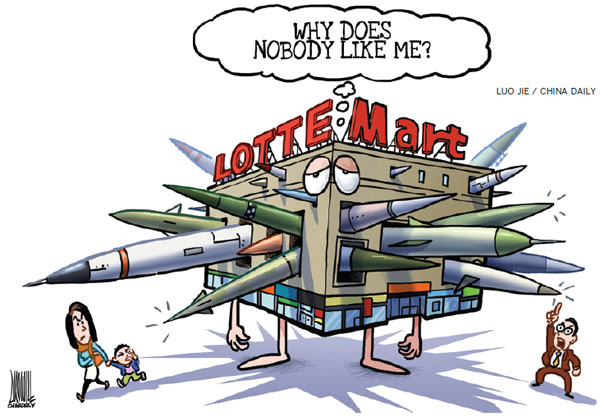Lotte may harm itself by yielding to THAAD
"No THAAD! Lotte out of China!" This is what was written on the banner held by a group of protesters in front of a Lotte-invested supermarket in the city of Qidong, East China's Jiangsu province, on Thursday.
Such protests were organized after the Republic of Korea conglomerate Lotte Group accepted a plot of land in exchange for its Skyhill Golf Course in Seongju where the US' Terminal High Altitude Area Defense anti-missile system will be deployed, a move which China is strongly opposed to because it will destabilize the strategic balance in East Asia in favor of the United States.
Does this remind you of a similar protest last year? In July, after an arbitration tribunal passed a biased verdict in support of the Philippines and against China in a South China Sea dispute case, groups of angry people in North China's Hebei province blocked the doors to some KFC outlets shouting slogans such as "Foreign brand out of China!"

Yet the two demonstrations have evoked different reactions. While many media outlets called the demonstrations against KFC "foolish", quite a few people support the protests against Lotte.
So what is the difference between the two protests?
KFC has seldom shown interest in international relations; it didn't say anything about the South China Sea maritime disputes and had no relationship with the arbitration tribunal. Therefore, those people protesting against KFC had little knowledge about the real world and were demanding that foreign brands be boycotted at random.
But Lotte's case is different. Intentionally or otherwise, it has become part of a military arrangement that poses a potential threat to China and its people. The Chinese government, which follows the rule of law and market economy, won't take any discriminatory action against Lotte, but the Chinese people have the right to vote with their feet and put pressure on a company that helps threaten their security.
Moreover, the tactics adopted by the anti-KFC and anti-Lotte protesters are different. Those protesting against KFC not only blocked the outlets' doors, but also asked the diners to leave their food and walk out of the restaurants, which is a violation of individual rights. However, there are no reports suggesting the anti-Lotte protesters have used such tactics. Instead, many of the protesters have gone online to say they respect other people's choice to continue buying Lotte's goods and services.
Some people, though, have defended Lotte, saying the company faced immense pressure in the ROK and it would have suffered heavy losses in the country had it rejected the ROK government's swap deal. But such defense is untenable, as THAAD remains a controversial issue even for ROK citizens.
On Monday, for instance, a large group of people gathered before the Lotte headquarters in Seoul and appealed to the company's executives to not accept the ROK government offer. Many people in the ROK know that THAAD does not guarantee as much security to their country as good relations with neighbors do. So had Lotte rejected the ROK government's swap deal, it might not have suffered huge losses in the domestic market.
And even if some consumers in the ROK boycotted Lotte goods and services, the Chinese market could have covered the resulting losses. Lotte has more than 120 shopping complexes in China, and their total revenue has increased sevenfold in seven years, reaching 3.2 trillion ROK won ($2.8 billion). In the first quarter of 2016, Chinese consumers spent 942 billion won in Lotte's outlets, which accounted for 70.8 percent of the Lotte's revenue worldwide, more than three times that from the ROK.
Lotte's final decision shows it does not care enough about the Chinese market, and may harm itself for that.
The author is a writer with China Daily. [email protected]
























